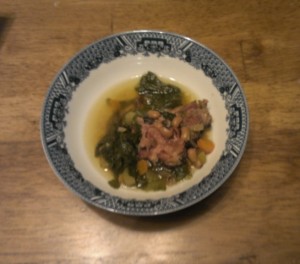 A traditional New Year meal for African-Americans includes greens and black-eyed peas. It’s a “good luck” meal of soul food. I’m not superstitious, but I recall having this meal “all the time” growing up, not realizing until I was in college that we actually only ate black-eyed peas once a year. We had no ceremony around it, perhaps other than my dad jokingly shouting into the kitchen, “Where’s my black-eyed peas?” It was just something that happened.
A traditional New Year meal for African-Americans includes greens and black-eyed peas. It’s a “good luck” meal of soul food. I’m not superstitious, but I recall having this meal “all the time” growing up, not realizing until I was in college that we actually only ate black-eyed peas once a year. We had no ceremony around it, perhaps other than my dad jokingly shouting into the kitchen, “Where’s my black-eyed peas?” It was just something that happened.
Before I go further, I should mention that soul food should more correctly be called slave food. The fixings of soul food (the bad parts of pork, tough bitter greens, beans, corn bread, etc.) constitute the scraped together diet that our slave ancestors survived on, and then just became a part of our culture. This diet will keep a people alive, but not necessarily healthy, especially in the modern world. While it still may be a traditional, personal taste, or economic eating choice for some, one can also be a Black-Hipster by going to a traditional soul food restaurant in Harlem New York, and perhaps eat at a table where a Civil Rights hero sat. I do not stand in judgement as I have eaten at Sylvia’s, but for me soul food had largely given way to Thai.
My wife, looking to be culturally balanced in our family, suggested we have black-eyed peas and greens at the new year. Having never cooked it, she called my mom and I got out The Joy of Cooking.
Why call it a Seder? To bring remembrance to something that I sometimes neglect, slavery and freedom. To the Jewish people, their meal remembers their slavery and Divine Deliverer. It is a slave meal, and a sacrifice. I can remember those acts also, in keeping with Negro Spirituals that identified the Hebrew slaves with their own slavery. Go down, Moses! And I remember Jesus’ Divine deliverance of my own life, body and spirit.
Other than the greens (our bitter herb?), we didn’t go out and buy anything extra, as this was not intended to be a feast. We picked up a can of black-eyes peas from the church food shelf, as it was an item nobody wanted. For meat, we threw in the ham bone left over from Christmas Eve. All the other fixings were whatever we had on hand: a leftover 1/4 of a red onion, some celery for the stuffing we hadn’t have time to prepare, a couple of garlic cloves we found hidden in the back of the produce drawer of our refrigerator, a child’s pack of baby carrots left over from a McDonald’s Happy Meal, and some salt. We scraped together a meal “slave-style,” and when the crock pot first started, my wife said, “That doesn’t smell too good.”
Three hours later she said, “That smells pretty good.”
We didn’t eat dinner that night. We went to bed a little hungry, the pot simmering all night, filling our home and dreams with the aroma of deliverance. Swing low, sweet chariot.

I will exalt you, LORD, for you lifted me out of the depths and did not let my enemies gloat over me. LORD my God, I called to you for help, and you healed me. You, LORD, brought me up from the realm of the dead; you spared me from going down to the pit. Sing the praises of the LORD, you his faithful people; praise his holy name. For his anger lasts only a moment, but his favor lasts a lifetime; weeping may stay for the night, but rejoicing comes in the morning. Psalm 30:1-5







Paul, you’re just awesome. This was a great post, and though it is difficult to relate to the idea of “slave food”, the idea of seder is something I can get used to. Thanks for this.
Thanks Jeff. Honestly, I didn’t entirely know what I was doing with the meal or this post myself until the idea of Seder came to me.
As far as “slave food,” I’m not sure if you meant I was unclear or you’ve never had to deal with scarcity. I haven’t really had to deal with scarcity either, other than the Ramman Noodle days of college. For slaves, it what eating what you were given, could grow, could find, or could steal, in the slaves’ “spare time” of course.
Exactly. I’ve never dealt with the scarcity of time or resources to not be able to enjoy what I’m doing/eating. But I also don’t have the generational/racial identity like you have or the Jews as you mentioned. The parallel between their Seder and yours is almost a foreign concept to me simply by the privilege I didn’t know I enjoyed as I grew up.
But I love the concept. I have more recent times in the desert, so to speak, and Seder is something I (am) can learn to incorporate in my life. This post was just inspirational.
I’ve never dealt with the scarcity of time or resources to not be able to enjoy what I’m doing/eating.
I believe that statement took real introspection, and is a brave confession. Thanks for posting it.
Thank you. My pleasure.